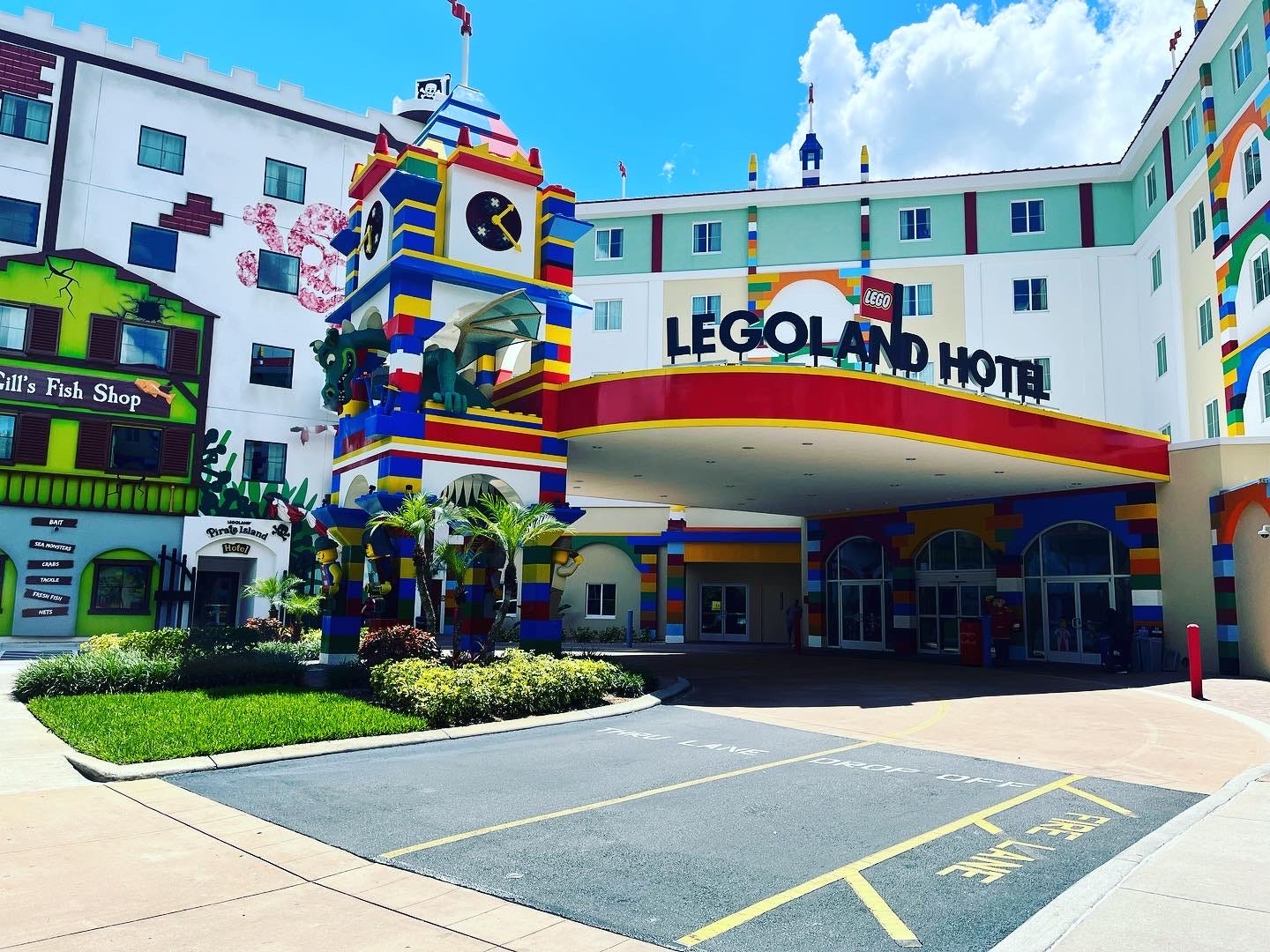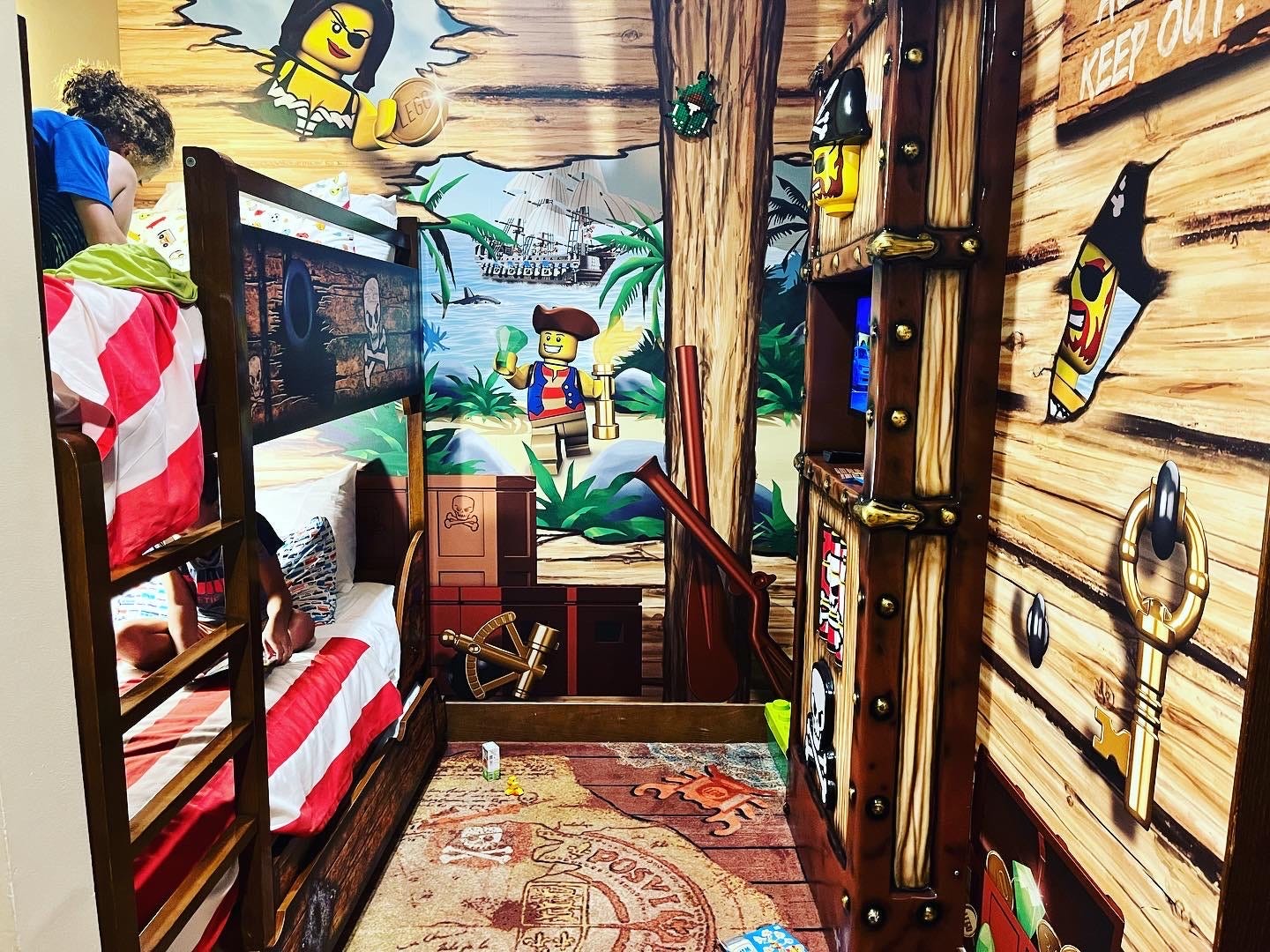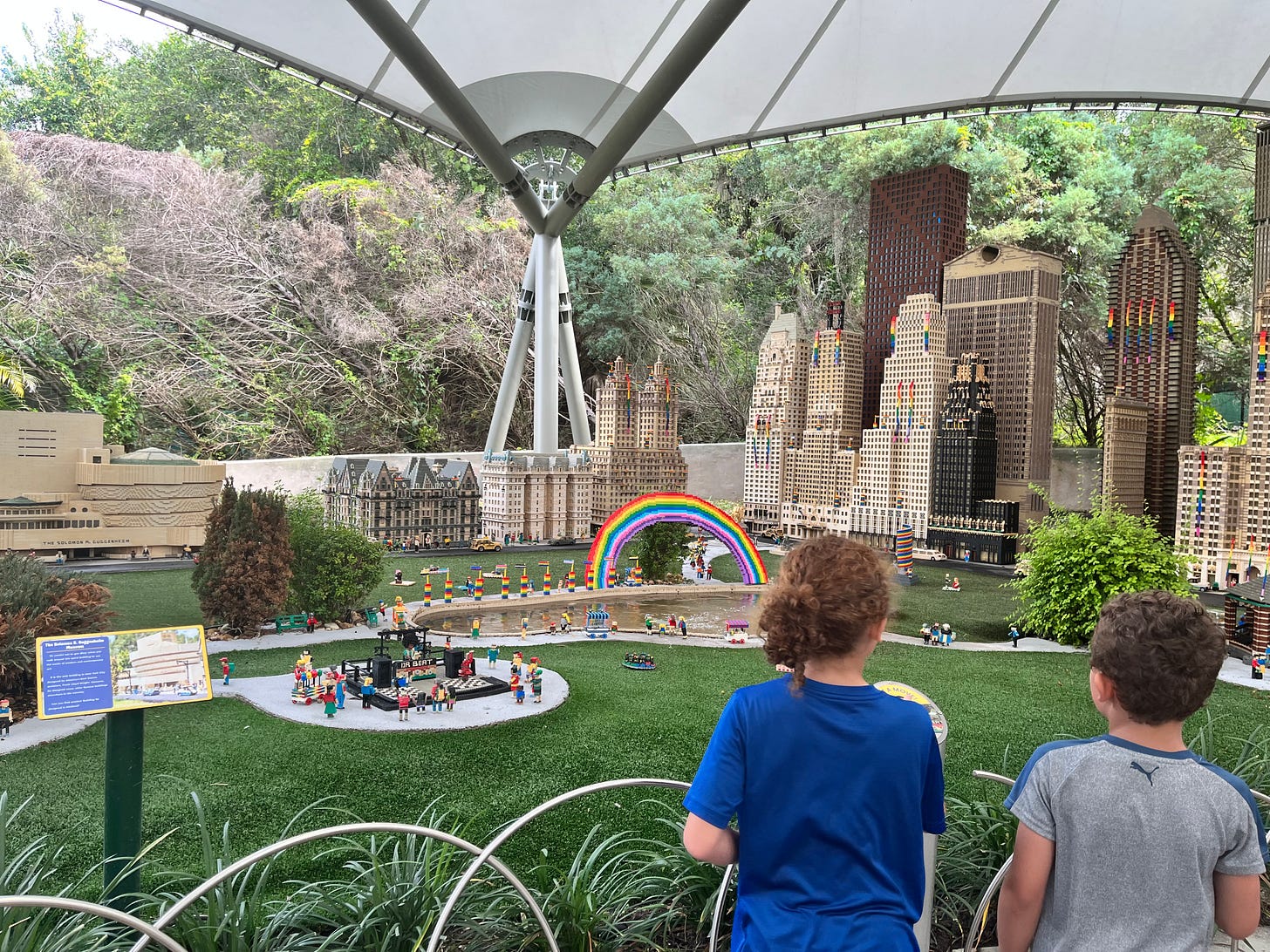Last week T and I took the kiddos to Legoland, FL for a few days. We’ve actually never been to a theme or amusement park before as a family, so this two day adventure in one of the most popular theme parks in FL was something I knew would be exciting for all of us.
One of the reasons we haven’t taken the kiddos to a theme park until now at the ages of 8 and (almost) 10 is because they are neurodivergent kiddos with various sensory needs and the younger they are the harder it is for them to express what they need and the more challenging it is to navigate a theme park with nap times, food aversions, and sensory overwhelm. Now that they are older and more self sufficient and have asked specifically to go to Legoland, we figured it was the right time.
Before our trip we watched YouTube videos, read travel blogs, and scoured the Legoland website in order to plan ahead, bring everything we need, and know what to expect. One of the reasons we chose Legoland as our first theme park experience is because it is so neurodivergent-friendly, small enough that we can walk end-to-end in about 15-20 minutes, and also because Legos are a special interest of both our kiddos.
With quiet rooms throughout the park for those who need a cool, quiet moment away from all the excitement that comes with theme park fun and signs posted in every area of the park including the hotel lobby and outside of every ride with sensory information (taste, smell, sight, touch, taste) and ratings from 1-5 based on the typical sensory experience of the area, Legoland has taken the needs of all kids into account in their parks design.
But what about when you are a neurodivergent parent?
As I found out, when you are neurodivergent yourself, it’s much more challenging be partially responsible for the safety, feeding, and fun-having of your neurodivergent kiddos at a major theme park.
It ended up that the kiddos were full of energy and fascination and wanted to do lots of rides and investigate every building and opportunity around them. They didn’t feel much need to slow down or take breaks, so it was full steam ahead the whole time!
Surprisingly, both kiddos were much braver than we imagined they would be. They were willing to try thrilling rides and water slides and ended up loving it.
Seeing our kiddos, who at times have anxiety that can be pretty debilitating for them, be so courageous and brave was absolutely wonderful and fulfilling for us. Watching them gain confidence in their own abilities, be proud of themselves for trying new things, and have an absolute blast was so wonderful.
I loved seeing their excitement over every little thing - paying attention to all the details Legoland put into their design.
Disney is known for their attention to detail, but Legoland is also full of amazing things to discover at every turn.
When we opened the door of our Lego pirate-themed hotel room and they saw that they had their own kids-only nook with bunk beds, their own kids TV, and container of Legos to play with I thought they would lose their minds with joy. And when they discovered there was a treasure chest with a lock they could unlock once they discovered the answers to the riddles left for them around the room, they could barely contain their excitement.
After spending a few years of their young lives living through a pandemic, struggling through a few tough years of public school, and not having much excitement in their lives lately, it was healing to see them have so much fun.
It felt like the first time in a long time we were having fun as a family away from home, experiencing new adventures together.
And yet. Despite all the fun I was having, at the end of our first day, I started to feel it. The anxiety. The overwhelm. The extreme discomfort I couldn’t escape.
We were all exhausted from a fun, but sweaty day in the hot FL sun, but I was feeling an ever-growing sense of panic in my mind and body. When we went to dinner I sat staring at the wall, rocking back and forth, trying to calm myself to no avail.
I used to stop myself from stimming because I didn’t want to stand out, but I have stopped stopping myself.
When my body and mind need me to fidget, zone out, or move in a particular way to regulate and calm myself, I do it. I also do my best to verbalize what I am feeling and what I need when I am aware and able to do so before I become overwhelmed. But sometimes overwhelm builds up I ways I’m not aware of until it’s too late.
Once sensory/nervous system overwhelm hits, it can be very difficult for me to connect with my feelings and express them.
Not that it is T’s job to read my mind or be responsible for my emotional regulation, but as my partner who loves and cares about me, he has learned a lot about my support and accommodation needs as a person who is ADHD and Autistic and does what he can to give me what I need when overwhelm hits.
Sometimes he knows before I do that I am feeling overwhelmed, anxious, or agitated. This is because part of being autistic is struggling with knowing what you are feeling and why you are feeling it.
We all went to bed relatively early that first night but after a fitful few hours of sleep, I woke up at 4:30am wide awake and feeling intense discomfort my body and lots of racing thoughts and anxiety. I couldn’t quit worrying about our second day at the park. We had planned ahead of time to go to the Legoland park when it opened and then go to the Waterpark when it opened and then leave in the late afternoon, but my mind raced over all the moving parts of how we would make it all work - of how I would be able to spend another day exerting myself when I already felt so overwhelmed.
By the time the sun came up and everyone was awake, I was a total wreck.
Historically, before being diagnosed as Autistic, when I would feel this way, I would try to hide how I was feeling so I wouldn’t let anyone down, disappoint anyone, be judged, or ruin anyone’s fun.
But hiding and trying to push through without help only makes things worse.
So this time, I decided to be brave and courageous like my kiddos had been and I told T what I was feeling and experiencing.
I think it’s important to say add that as I was sharing I was not doing so in some regulated, calm manner. I had been fighting with big feelings and body discomfort all evening and night and everything was venting out of me a bit like a geyser erupting.
Then after I shared everything, I started to cry. I’ve recently come to understand that crying is one of the main ways my body prefers to release the stress and pressure I am feeling when I get overwhelmed and overstimulated.
Normally, I would try and stop myself from crying or hide and cry where no one would see me, but I didn’t this time. Because I knew having T to support me through this regulation process and not trying to hide or to regulate on my own was an important part of getting to a place where I felt better and was also an important part of staying connected to my partner by trusting him with my needs and vulnerable moments.
Knowing I am not alone helps me regulate.
Having someone to co-regulate with helps me remember how to calm myself when my mind is racing.
T was very supportive and understanding. He listened and used comforting, calming words. We worked together to come up with a plan for the day that would help calm all the whirling anxiety in my mind about how we were going to do it all.
I told him that it’s hard to explain, but despite all I am feeling, I am having fun and want to stay and want to do all the fun things.
That’s the thing with sensory processing disorder. You can really REALLY want to do something, and even be having a lot of fun doing it, but once your senses become overwhelmed or you become overstimulated, your body and mind go into protection mode whether you want them to or not.
It’s not a choice.
If accommodations aren’t made quickly enough to regulate and calm the nervous system, sensory overwhelm can take over. This is where “autistic meltdowns” and emotional dysregulation can leave children, teens, and adults with sensory processing issues unable to function at normal capacity or even at all depending on the situation.
This isn’t our fault. Instead of blame, we need support, patience, understanding, safe spaces, and someone to co-regulate with us so we can calm our nervous systems.
Once I shared what I was feeling, cried, and we came up with a plan for our day, I was eventually able to organize my feelings, feel calmer in my body and mind, and was able to move on through the rest of our day one step at a time and remain regulated and even have lots of fun.
This isn’t always what happens when overwhelm hits. Sometimes the fun is over for everyone and it is what it is. There are times when it’s not healthy to keep going. Pushing ourselves will only delay our ability to get back to baseline. There are times we will disappoint people because we need to leave or not do something.
And that is okay.
People are allowed to feel their feelings. But we aren’t responsible for other people’s feelings.
We have to take care of ourselves even if that means that sometimes other people will be inconvenienced or let down. This is a reality of being autistic/ADHD and to try and hide it only causes trauma and a chronically dysregulated nervous system.
I am realizing that a lot of my anxiety comes from sensory overwhelm and knowing this has helped me tremendously in being able to do what I need to do to avoid sensory overwhelm and also regulate once the overwhelm hits.
A lot of my parenting guilt over the years has come from the ways I have lost my patience or been overly anxious with my children due to sensory overwhelm and not knowing what I was feeling, why I was feeling it, and what to do about it.
I can read a million parenting books/blogs, go to therapy, and know deep in my heart and soul the kind of parent I want to be, but if I am dysregulated, overstimulated, tired, and overwhelmed, it is very challenging to do what I want to do as a parent. It’s not impossible, but the daily demands make staying regulated really hard - especially if I am under any kind of additional stress.
Knowing what triggers my sensory overwhelm is truly life changing for me.
Being a parent of neurodivergent kids and being neurodivergent myself can be difficult. Especially when we are all overwhelmed and all in need of some help regulating at the same time (this scenario isn’t infrequent).
But now that I am no longer spending energy hiding my differences and my needs, I have more energy to love and care for myself and others better and accommodate my needs and the needs of those around me in ways that make daily life much more fulfilling and enjoyable.







I’m so glad T is there for you and you are both there for the boys. You have a wonderful family that feels loved ♥️